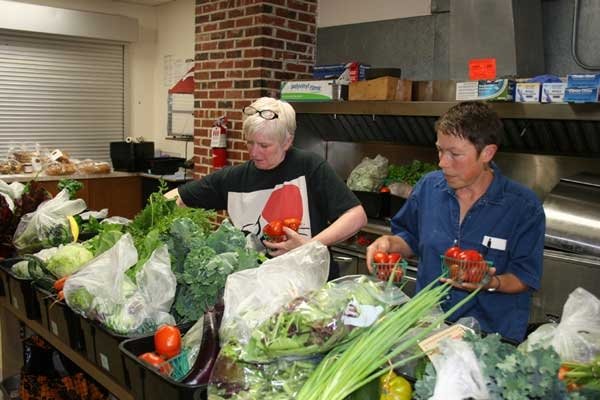 Fresh Food Revolution Co-Op members and volunteers Lynn Hallowell and Barb Schoos sort produce into members' bins prior to customer pickup. Photo courtesy Holly Hendrick
Fresh Food Revolution Co-Op members and volunteers Lynn Hallowell and Barb Schoos sort produce into members' bins prior to customer pickup. Photo courtesy Holly Hendrick
Erin Reetz has been coming to Key Pen from Fox Island almost weekly for the past few months. The attraction? Fresh Food Revolution, a Key Pen food co-op that marked its first-year anniversary earlier this summer.
“(The co-op) struck me as an exciting local resource for local and organic food. Being someone in search of those type of resources, I thought it was something I wanted to support,” said Reetz, who sometimes drives over with her friend, another co-op member who lives on Fox Island.
Reetz heard about the co-op through Facebook last year and joined toward the end of the farming season. She said she’s excited to see new vendors being added since, such as, most recently, a fair trade coffee roaster.
“It is expanding, and that’s what I appreciate,” she said.
Fresh Food Revolution has more than two dozen vendors on board who grow or produce everything from vegetables and pickles to chocolate and grains. Members place orders online every week, and then pick them up on Wednesdays.
“Members can order as much or as little as they want,” said Holly Hendrick, co-founder and board president. “The season is year-round.”
Membership costs $25 per year and members pay for their orders on pickup day, with some exceptions.
“It’s a really good deal for $25 per year for access to all these wonderful farmers, and to get to know all the people who share a common desire for local and organic foods,” Reetz said.
Members are also required to volunteer the equivalent of one hour a month, but Hendrick said the co-op is very flexible with how they can contribute. Volunteer options range from weekly sorting and administrative work to one-time projects.
Most producers are members as well but the volunteer portion is waived for them. They pay 10 percent of their sales to the co-op, capped at $15 per week.
The idea of the co-op was born a couple of years ago when a small group looked for an alternative to the short farmers market season. They tested out the concept for about six months.
“We did it to see if people would take ownership to do what needs to be done,” Hendrick said. “It was wildly successful.”
To avoid competition with the farmers market as well as make sure producers have as many venues as possible, the organizers selected Wednesday as the pickup day from the start. (Key Pen no longer has the farmers market in Key Center though Drive Thru Feed has opened its site to vendors.)
The co-op became an officially registered nonprofit with the state in June 2011 and eventually it will pursue a federal 501(c) 3 status as well. The logistics of the weekly workings have been evolving. During the six-month trial, producers received money directly from the buyers while now the co-op handles the payments and pays the farmers the following week.
Ordering has been streamlined. Originally, it required hours of manual labor by Hendrick but now, everything is largely automated. The board raised funds last year through the members to invest into software for an online shopping cart.
Producers input their inventory Thursday through Saturday, and members receive an email Sunday morning. They have until Monday evening to shop and place orders and the system keeps track of availability and sold-out goods.
“It’s incredibly convenient, in my opinion,” said Errika Stanley, a member who raved about the co-op so much, her mother-in-law recently joined, too.
“The whole experience is fabulous,” Stanley said. “It’s very similar to going to the farmers market but you can peruse online what’s available prior to placing an order. … It’s a treat to pick up the produce.”
One of the aspects the co-op is trying to increase is public education — which is also a requirement for their 501(c) 3 application. Plans include workshops and classes both for the public and for the producers. One goal is to educate the public about the benefits of growing their own food.
“Part of what we want to do is encourage local people to grow produce and sell it through the co-op,” Hendrick said.
That’s exactly how Lynn Lloyd got started. A member for about a year, she was inspired to become a small-scale vendor. So far, she’s focused on herbs and she’s testing the waters for growing more in the future so she could sell at a farmers market.
“A cooperative is a good model. … (I like) the idea that there’s a market locally and I don’t have to do it on a larger scale,” she said. “It’s quite simple to do and it opens the door.”
The group is working on a new permit that would allow for the sale of refrigerated foods such as dairy and meats, and has reached out to producers well beyond the Key Pen. Producers also have a voice on the board.
Hendrick said now that first-year basics have been worked out, the board is looking at new ideas. She said the overall mission is to teach people to eat well as well as support the local producers and local economy. And it appears to be working.
“I think it’s changed my shopping habits for the better,” Stanley said. “My mother-in-law and I have been trying to support local businesses and shopping locally and it’s great to be rewarded for it, too, with great produce. It also creates a sense of community and it’s connecting people in a different way.”
UNDERWRITTEN BY THE FUND FOR NONPROFIT NEWS (NEWSMATCH) AT THE MIAMI FOUNDATION, THE ANGEL GUILD, ADVERTISERS, DONORS AND PEOPLE WHO SUPPORT INDEPENDENT, NONPROFIT LOCAL NEWS